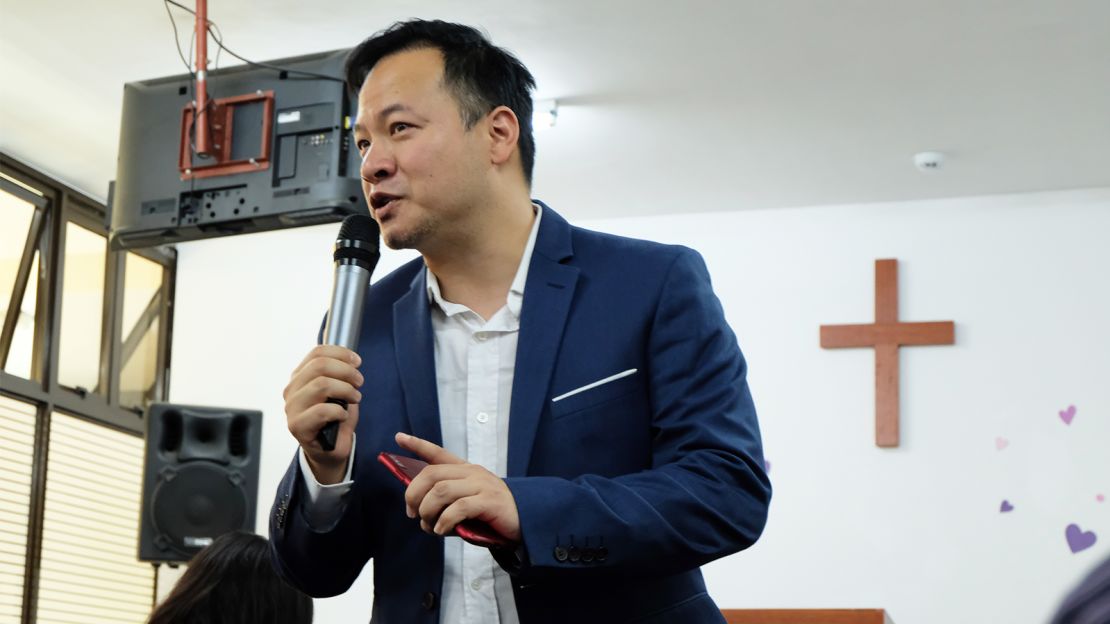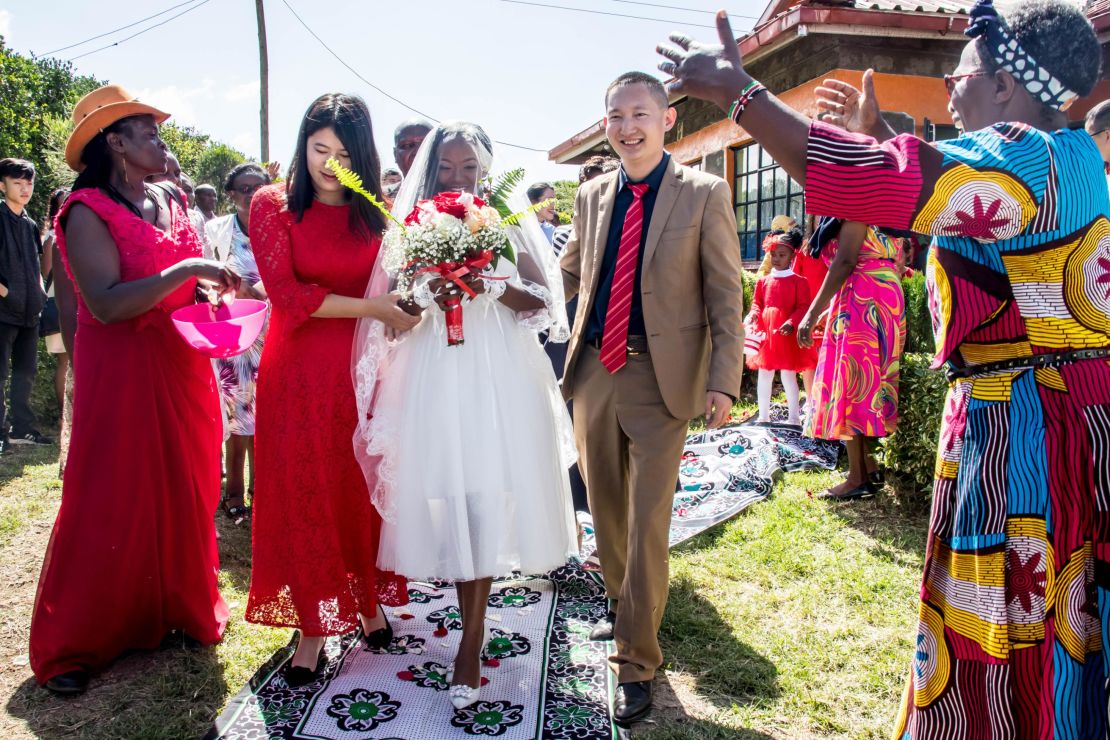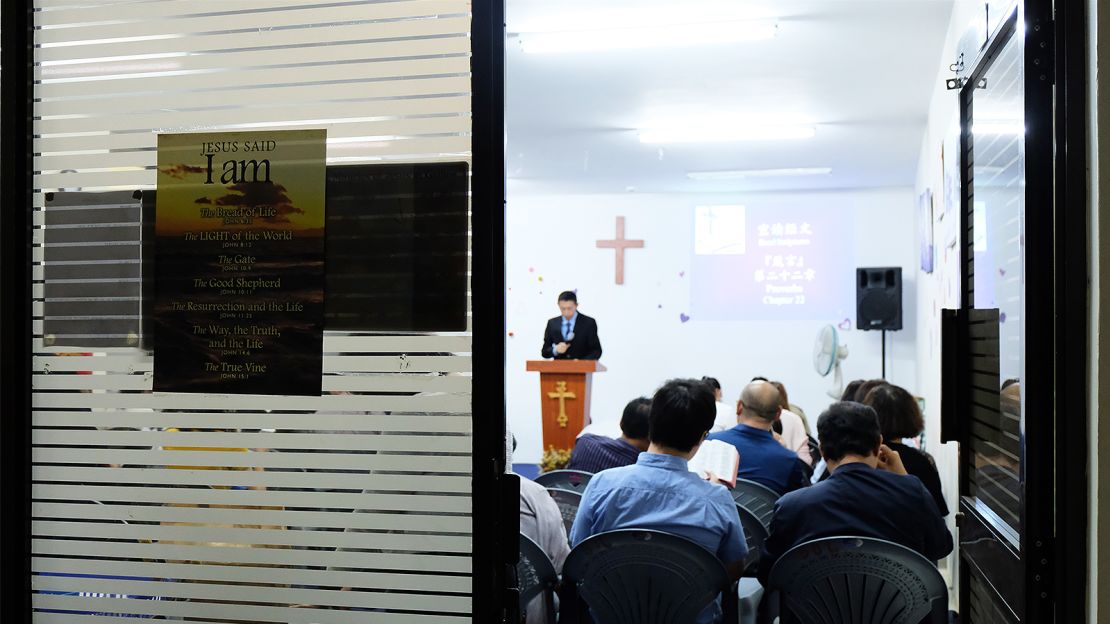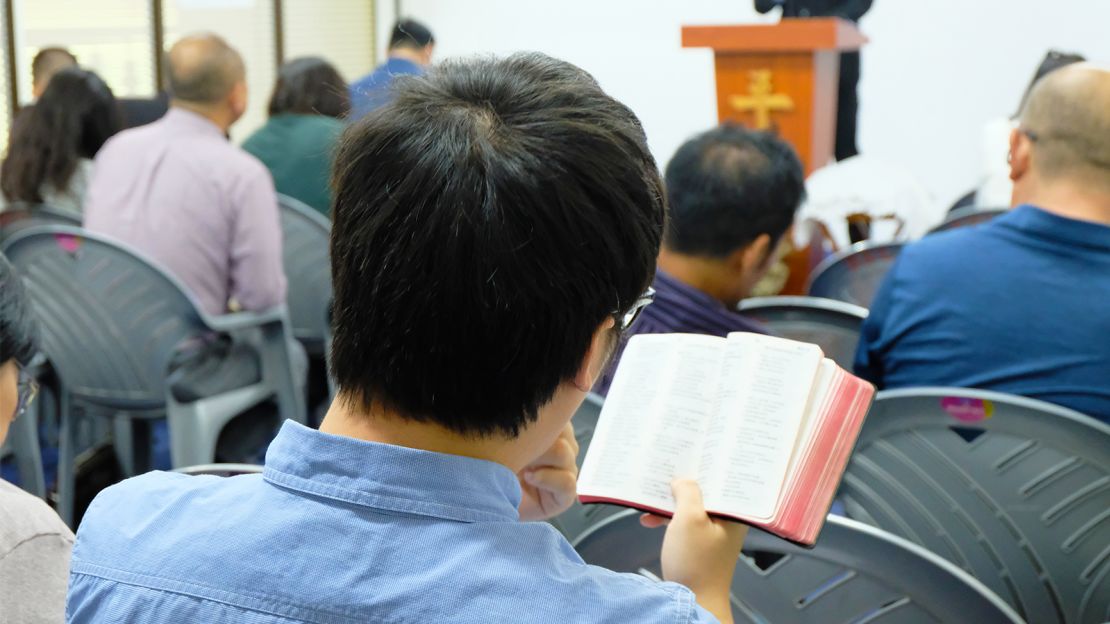Every Sunday morning in an affluent suburb of Nairobi, Kenya, the soaring song of Chinese hymns fills the empty corridors of a Monday-to-Friday office block.
Inside a small makeshift chapel, a kaleidoscopic congregation of Chinese migrants gather to pray. Among them are underwear importers, health workers and operators of the controversial new $3.8 billion Chinese-built railway that slices through Kenya, the country’s biggest infrastructure project since independence – and a sign of China’s growing investment and footprint on the continent.
Some have married Kenyans, others have Chinese children who speak Swahili as well as they do Mandarin.
But they all share two things. Each person here has re-rooted their life from Communist China to Kenya, a leading African economy where 80% of the nearly 50 million people are Christian. And they have all decided to openly embrace God.

Their religious awakening comes at a perilous moment for Christians in China, as the Communist Party government bans online sales of bibles, dynamites churches and arrests Christians for “inciting subversion of state power.” The Communist Party sees any large group outside its dominion as a threat.
“Publicly, it’s dangerous to be a Christian in China right now,” says Jonathon Chow, 43, a senior pastor at the Bread of Life Church, which is headquartered in Taiwan but has 500 ministries, including many in West Africa.
Previously, the organization’s churches in Africa tended to be run and attended by Africans, he says. But increasingly Bread of Life is seeing Chinese-led congregations forming across the continent, as more Chinese move to Africa and interact with local values.
The Golden Lampstand Church, in China, was demolished with dynamite and heavy machinery in January 2018.
Throughout the service, a middle-aged couple from Shandong province, who say they are new to Kenya and the ministry, post audio clips of hymns and photographs of readings onto WeChat, a social network closely monitored by the Chinese government.
“Most of the congregation here got saved in Kenya,” says Chow. “Unless they were a believer before they came, most don’t know a lot about the Christian conditions in China.”
‘The Kenyan wedding everyone is talking about’
The first time Liang Yongyu met Karen Ngunjiri at the billboard advertising company where they both worked in Nairobi, he told her she would be his wife.
The pair dated for 6 months, then hit a roadblock that threatened to scupper his swaggering prediction. Liang, 33, was not a Christian.
“That was a deal breaker for me,” says Ngunjiri, 29, who spent four years studying Mandarin in Nanning, south-west China. “Him being Chinese? Not a problem. But him not being a Christian, I thought that was going to be a big issue. How would we bring up our children?”
Liang had lived in Kenya for a “long time,” could speak some Swahili and had been “hearing a lot about Christianity” from his Kenyan friends, Ngunjiri says. After some soul searching, he said he “was open to exploring what Christianity had to offer,” she adds.
Liang connected with a church in Nairobi that held services in Cantonese – the language spoken in his home province of Guangdong, in southern China, and Hong Kong, where the pastors who founded the ministry were from.
In December 2018, those Hong Kong pastors married the couple in a Christian ceremony in the shadow of Mount Kenya in front of 200 guests – “a small wedding for Kenya,” jokes Ngunjiri.
Weeks later, a video of their wedding went viral on YouTube with the title: “THE KENYAN WEDDING EVERYONE IS TALKING ABOUT.” Ngunjiri still doesn’t know who uploaded it, but for months the newlyweds couldn’t walk down the street in Nairobi without being recognized. The novelty of a Kenyan woman marrying a Chinese man had got people’s attention.

“Some of the comments (online) were horrible,” she says, of the video that has since been taken down, but at its peak had nearly 300,000 views, according to Ngunjiri. “Especially from Kenyans. There’s this idea that the Chinese are here to steal our jobs or colonize us. So the joke was now they’re stealing our women.”
In 2017, China was Kenya’s largest trading partner and, in 2014, the country was home to an estimated 40,000 Chinese migrants. But their relations with Kenyans have, at times, been tense.
In 2015, a Chinese restaurateur reportedly banned African patrons after 5 p.m., last year a Chinese boss was deported from Kenya after being caught on video calling an employee a “monkey,” and local media has claimed that Kenyan workers on the Chinese-built railway have been treated like second-class citizens by their foreign employers.
Kenyans are also concerned about how much debt their country owes to China. Last year, in a seeming show of strength against Chinese dominance President Kenyatta Uhuru banned imports of cheap Chinese fish, amid claims it was squeezing out local produce. But his ban was soon reversed: Kenya does not produce enough fish to feed itself.
Kenyan workers on the Standard Gauge Railway; Chinese supervisors on the platform in Nairobi; Kenyan staff man the modern terminal.
The anti-Chinese commentators on Ngunjiri’s wedding video, however, had perhaps missed the point.
Rather than Ngunjiri being overpowered by Chinese culture, it was Liang who had changed his faith and agreed to a Christian African wedding with just 20 Chinese guests who didn’t include his mother, embracing a new culture 5,300 miles from home.
A new door opens
An estimated 1 million Chinese have moved to the African continent in the 21st century, according to journalist Howard French’s book “China’s Second Continent,” amid growing trade ties between the two regions. But what is perhaps unique about Kenya’s Chinese population, and why it is embracing the country’s religious culture, is its diversity. A 2015 study found the Chinese in Kenya are spread “across every sector in a significant way.”
This makes a difference. Employees of government-owned giants, shipped out to build roads in Uganda or airports in Zimbabwe, for example, are typically bused to and from work and must stay inside their compounds in the evenings and at weekends unless given approval to leave by a manager. But in Nairobi – a vibrant city home to African tech giant M-Pesa, which revolutionized mobile banking in East Africa – a younger generation of Chinese are working in the private sector, freer to explore new cultures and belief systems through their personal connections with local people.
Annie Hu, 30, began attending church in Kenya; Chinese and Kenyan employees mix at a media company office; the China Center where many Chinese expats have businesses.
Among them is Annie Hu, 30, who relocated to Kenya five years ago and works for a Chinese financial technology, or fintech, giant. She says the 9-to-5 “pole pole” (meaning “slowly slowly” in Swahili) lifestyle here is more attractive than the 9-9-6 grind – working 9 a.m. to 9 p.m., six days a week – at some of China’s biggest technology companies in the country’s Silicon Valley city of Shenzhen, where she relocated from.
“Living in a developing country and international city you encounter different nationalities, races and lifestyles,” Hu says. After frequently traveling for work to the Muslim majority city of Dar es Salaam, in Tanzania, she went to Lebanon and Jordan last year to learn more about Muslim culture. “It opened a totally new door for me,” she says. Asked how she felt about China’s treatment of Muslims, Hu replies: “We need more understanding.”
Hu’s family is Buddhist but in Nairobi she has attended Christian churches, including one led by Hong Kong pastors, as well as a Maasai church. “Kenyans believe in God more than my Western friends,” she says. “Once we engage with the local community it’s inevitable we are invited to join the church. These people are very friendly and reliable and they try to build a supportive community for the Chinese.”
Chow from Bread of Life agrees the church is an important social network for newcomers. “I also think the cultural differences and the hardship the Chinese experience here means they are more open to the gospel,” he says.
For Hu, flirting with various Christian communities hasn’t resulted in a full conversion. “It’s brought more different religions into my life … But I didn’t reach a point where I felt I want to become a serious Christian yet. Not yet,” she adds.
The world’s biggest Christian nation?
It is not only the Chinese in Kenya who are embracing Christianity. Many Chinese students in America, Australia and the UK are returning home Christian, says Ian Johnson, author of “The Souls of China: The Return of Religion After Mao.” Their conversion chimes with a broader trend at home: China itself is on track to be the world’s biggest Christian nation by 2030, by some estimates.
For much of the 20th century, Chinese citizens were taught to worship the founding father of the Communist Party, Mao Zedong, the revolutionary leader who destroyed much of the nation’s Buddhist and Taoist religious infrastructure during the Cultural Revolution. “There used to be 900 temples in Beijing alone,” says Johnson. “Now there are 20.”
Mao’s death in 1976 left the Chinese searching for a new value system. Christianity seemed fresh and modern to the country’s newly urban residents, Johnson says, although more people in China are still Buddhist.
By 2017, there were between 93 million and 115 million Christians in China – around 5% of the country’s population – but fewer than 30 million practice in official churches, according to Purdue University scholar Yang Fenggang. If those estimates pan out, there would now be almost as many Christians in China as there are members of the Communist Party, which had an estimated 90 million members in 2016.
That has riled the government. Under President Xi Jinping rhetoric has grown on the need to “Sinicize” religions perceived to be Western, despite the fact many Christians in China do not feel “un-Chinese or foreign,” says Johnson.

Today, only state-sanctioned Christian organizations are legal in China. Overcrowded state churches run as many as 5 services a day and their pastors’ wages are paid by the government, says Johnson. The alternatives are so-called house churches which operate illegally but can offer a more personal ministry, with pastors on first-name terms with their congregation.
For years, such churches were tolerated in China but recently they have become a target of the authorities and their requests to register with the state are often rejected.
In December 2018, one of China’s best-known underground ministries, the Early Rain Covenant Church, in Chengdu, was raided. The pastor and his wife were charged with “inciting subversion,” which can carry a 15-year prison sentence, and more than 100 worshipers were arrested.
An underground church in Kenya
Kenya is not a place you’d expect to find an underground church. Christianity is the lifeblood of the nation’s politics and societal fabric, and is celebrated in huge, rambunctious services attended by thousands of dancing and singing worshipers.
But, in the northern stretches of the sprawling, traffic-choked capital of 4 million people, an underground Chinese house church is exactly what May Li, wife of a Malaysian-Chinese pastor, helps to lead – illustrating just how far the Communist Party’s religious crackdown has traveled. Li and other Chinese Christians in this story did not want to use their real names for fear of being punished by the government when they return to China.
The Chinese embassy in Nairobi has already reached out to the leaders of some Chinese Christian groups in the city and asked them to desist, says Li. Her service tries to stay below the radar.
It’s notable that the three main Christian churches in Nairobi are run by Chinese pastors from Taiwan, Hong Kong and Malaysia – places outside mainland China where Chinese people enjoy more Christian religious freedom.
A spokesperson for China’s Ministry of Foreign Affairs (Mofa) in Beijing said it was “not aware” of this situation, adding that China does not have “so-called house churches.”
“The Chinese government respects its people’s religious freedom and protects normal religious activities and legitimate rights of religious organizations, and manages religious issues pertaining to national and public interests in accordance with law,” the spokesperson said via fax. “At the same time, we require all religions to obey national laws and carry out activities within the law.”
On Sunday afternoons, Li’s underground church meets in a small basement room of a huge Kenyan church. No photography is allowed. No names of attendees can be revealed. No Chinese person here wants to be outed as a Christian.

“These people will one day go back to China,” says Li, explaining that this congregation is a transient group often working in Kenya for short stints. Most were Christian before they came and, if they belonged to a house church, are aware of some of the risks.
Church translator Grace Zhang, from Hubei province, falls into that category. “Things are very difficult for my church in China right now,” says Zhang, who did not want her real name used. She became a Christian with her mother in 2002 and relocated to Kenya to proselytize to Chinese abroad, as well as to Kenyans.
Despite her work, Zhang hesitates to call herself a missionary – “that’s a sensitive word,” she says. Chinese law bans missionary work in China. Instead, Zhang prefers the term “cultural mediator.”
Many Africans from Uganda, Burundi, Kenya and Sudan also attend the bilingual service, which is delivered in English and Mandarin, hoping to improve their language skills or learn more about China. “God gave them the burden of loving the Chinese,” Zhang says.
Through their interaction at the church, Zhang helps Africans and Chinese better understand each other. She explains to the Chinese, for example, that Kenyans place a high value on in-depth greetings, meaning that asking about the well-being of multiple family members is a cultural necessity. She warns Africans that many Chinese do not respond well to overly physical greetings.
“We try to learn from both sides,” she says.
China vs God … going home
In Chinese state media, the clampdown on faith goes largely unreported and Christianity is “virtually invisible,” says Johnson – the government doesn’t want to “encourage anyone to think about religion.”
That explains why worshipers at the Bread of Life church in Nairobi are open about sharing their Christianity. This is a more settled congregation. Having found religion abroad and been out of China for several years, in most cases, they often simply do not know the extent of their government’s crackdown, says Chow – although many have a sense the government is not enthusiastic about religion.
When members want to repatriate, however, they have to be enlightened of the potential risks.
Maggie Wong, 35, a pastor at Bread of Life, says the church tries to prepare them for what they will face and has a network of underground churches to connect them with. “It’s very stressful,” she says.

“From a spiritual perspective, I think it’s not easy for returnees to survive when they go back to their home country if they live overseas,” says Zhang, from the underground church. “When they go back we keep in touch with them and even Skype for bible study.”
Some Christians in Kenya, however, who learn of the potential dangers that await them in China say it could be a deterrent from returning.
Jimmy Hong Zhen Wu, 53, a trader from Guangdong province, became Christian during the decade he has spent living in Kenya, where his wife has given birth to two daughters now under 8 years old. He travels to China regularly for work and says he is conscious of the double life he would need to lead back home.
“In public, in China we can’t speak about our faith,” says Wu, who did not want his real name used. “Only with friends and family can we say we are Christian.”
Whether his daughters, who have spent their lives in a proudly Christian society attending church every Sunday, will understand those confines if their family one day heads back to China remains to be seen.
Editor’s Note: This story has been updated to clarify remarks by Annie Hu in her interview with Jenni Marsh on April 1, 2019.

